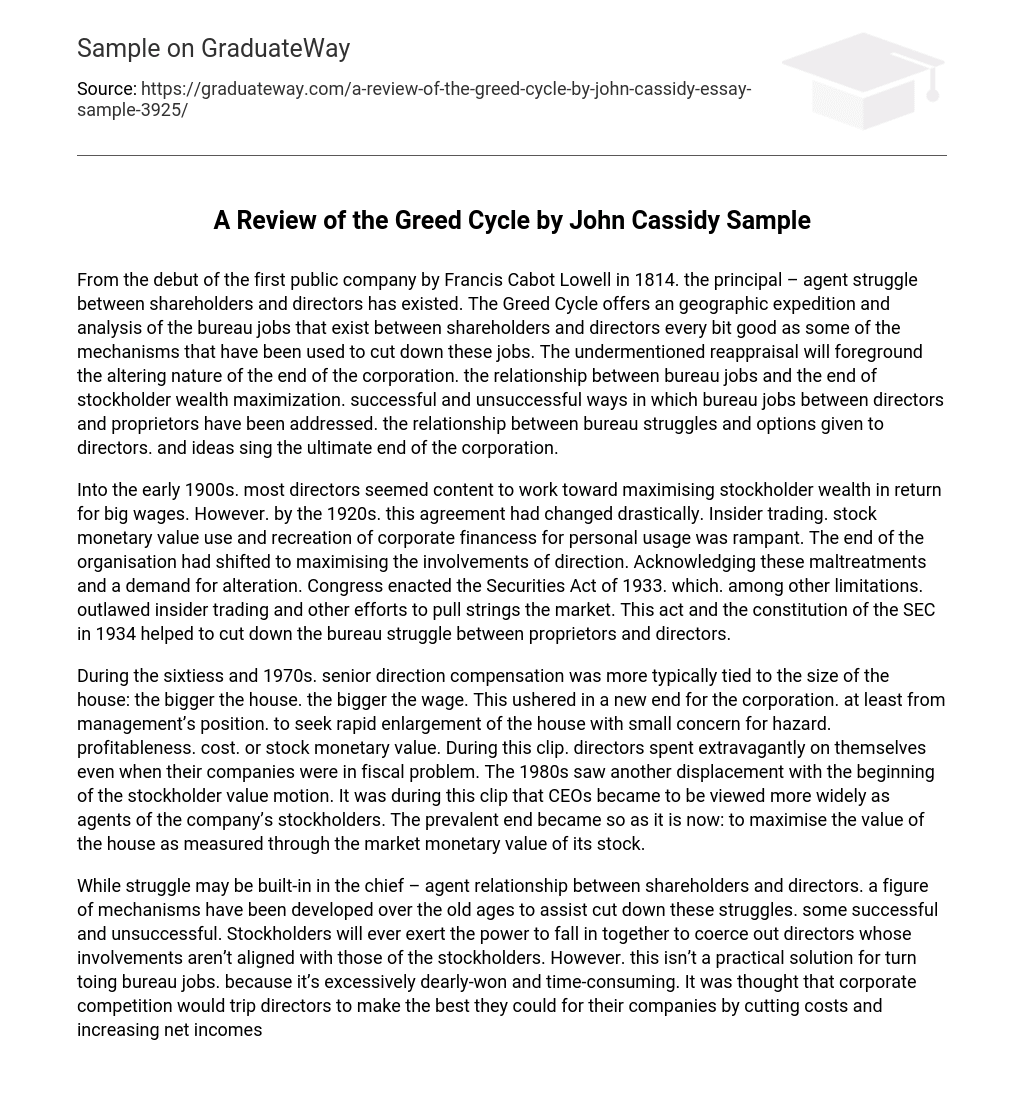From the debut of the first public company by Francis Cabot Lowell in 1814. the principal – agent struggle between shareholders and directors has existed. The Greed Cycle offers an geographic expedition and analysis of the bureau jobs that exist between shareholders and directors every bit good as some of the mechanisms that have been used to cut down these jobs. The undermentioned reappraisal will foreground the altering nature of the end of the corporation. the relationship between bureau jobs and the end of stockholder wealth maximization. successful and unsuccessful ways in which bureau jobs between directors and proprietors have been addressed. the relationship between bureau struggles and options given to directors. and ideas sing the ultimate end of the corporation.
Into the early 1900s. most directors seemed content to work toward maximising stockholder wealth in return for big wages. However. by the 1920s. this agreement had changed drastically. Insider trading. stock monetary value use and recreation of corporate financess for personal usage was rampant. The end of the organisation had shifted to maximising the involvements of direction. Acknowledging these maltreatments and a demand for alteration. Congress enacted the Securities Act of 1933. which. among other limitations. outlawed insider trading and other efforts to pull strings the market. This act and the constitution of the SEC in 1934 helped to cut down the bureau struggle between proprietors and directors.
During the sixtiess and 1970s. senior direction compensation was more typically tied to the size of the house: the bigger the house. the bigger the wage. This ushered in a new end for the corporation. at least from management’s position. to seek rapid enlargement of the house with small concern for hazard. profitableness. cost. or stock monetary value. During this clip. directors spent extravagantly on themselves even when their companies were in fiscal problem. The 1980s saw another displacement with the beginning of the stockholder value motion. It was during this clip that CEOs became to be viewed more widely as agents of the company’s stockholders. The prevalent end became so as it is now: to maximise the value of the house as measured through the market monetary value of its stock.
While struggle may be built-in in the chief – agent relationship between shareholders and directors. a figure of mechanisms have been developed over the old ages to assist cut down these struggles. some successful and unsuccessful. Stockholders will ever exert the power to fall in together to coerce out directors whose involvements aren’t aligned with those of the stockholders. However. this isn’t a practical solution for turn toing bureau jobs. because it’s excessively dearly-won and time-consuming. It was thought that corporate competition would trip directors to make the best they could for their companies by cutting costs and increasing net incomes every bit much as possible. Through the work of fiscal economic experts Michael Jensen and William Meckling. we learn that directors will non automatically work to maximise stockholder value in the face of competition. Government ordinance and corporate administration can be effectual tools for controling some unethical agent behaviours. such as insider trading. but are non plenty to extinguish bureau jobs. In his article. Cassidy discusses the leveraged buyout ( LBO ) as an illustration of another mechanism for maintaining direction focused on stockholder wealth: the menace of coup d’etat. Directors have inducement to maximise shareholder wealth. because maintaining stock monetary values high was an effectual hindrance to coup d’etat. While the menace of coup d’etat may still be an effectual mechanism. LBOs mostly fell out of favour during the recession of the early 1990s.
The debut of the stock option as a constituent of executive compensation offered yet another mechanism for turn toing the struggle between shareholders and direction. Stock options provided executives with a great inducement for maximising the firm’s stock monetary value: the chance to harvest tremendous personal net incomes! Unfortunately. it wasn’t long before stock options were being abused. Over clip. stock options became an inducement for some company directors to utilize accounting fast ones to misdirect investors about the firm’s value in order to increase the value of their ain options. While some of these methods even produced short-run additions for the house. they were frequently harmful to a firm’s long-run wellness and profitableness. It’s Cassidy’s sentiment that stock options aren’t a good step of management’s part to the house. because the value of the stock is largely out of their control. Investors. non directors. find a company’s stock monetary value. Because of the enticement to mistreat stock options for personal addition. economic experts such as Paul Volcker now conclude that stock options should be eliminated.
The most widely recognized end for the public house is maximising its stockholders wealth as step through the market monetary value of its stock. However. the built-in struggle of involvement between shareholders and directors can do it hard for direction to remain focused on this end. A figure of mechanisms exist to cut down these bureau struggles. Some have been more successful than others. New mechanisms for cut downing bureau jobs will go on to be developed and with them new chances for maltreatment will be discovered. While direction is finally accountable to the proprietors of the company. investors should understand the hazards and struggles built-in in the relationship.





